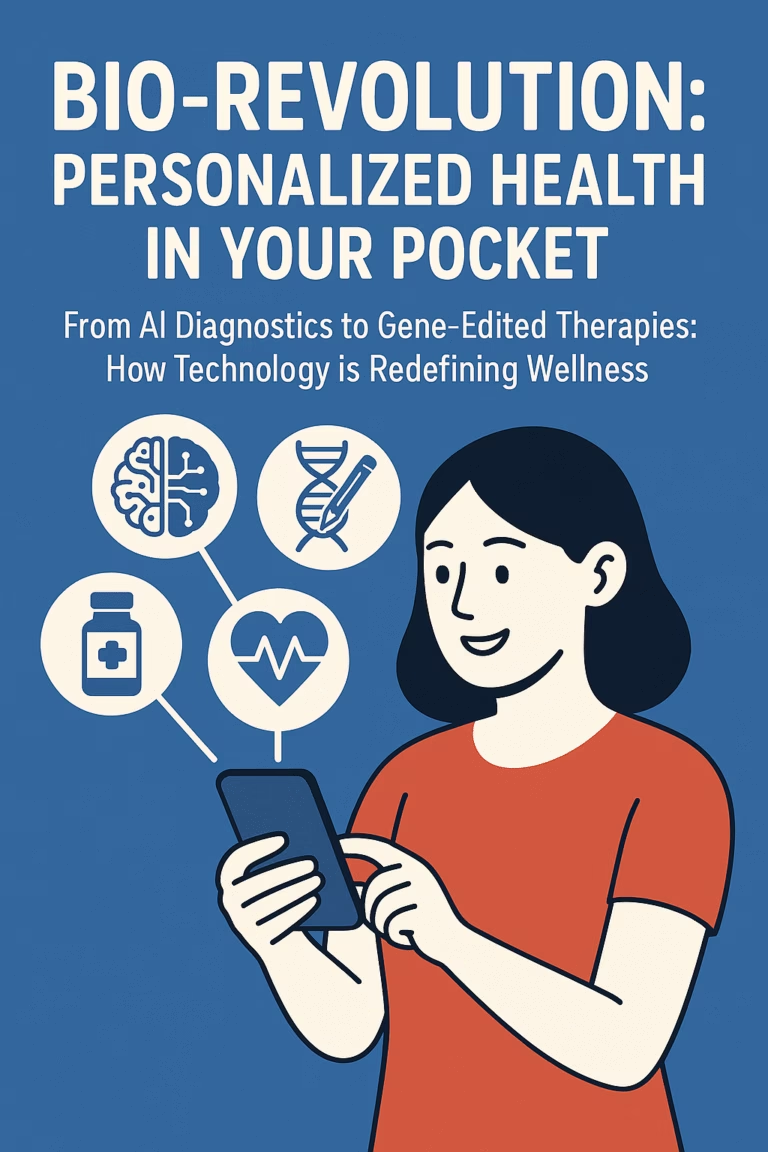From AI Diagnostics to Gene-Edited Therapies: How Technology is Redefining Wellness
The healthcare landscape is undergoing a seismic shift. We’re moving from a one-size-fits-all approach to a world where your smartphone can diagnose diseases, your genes can be edited like a Word document, and your treatment plan is as unique as your fingerprint. Welcome to the bio-revolution – where the convergence of artificial intelligence, genomics, and mobile technology is transforming how we understand, prevent, and treat illness.
The Dawn of Pocket-Sized Diagnostics
Gone are the days when medical diagnosis required expensive equipment confined to hospital walls. Today’s smartphones are becoming powerful diagnostic tools, capable of detecting everything from skin cancer to heart arrhythmias. Companies like Butterfly Network have developed pocket-sized ultrasound devices that connect to smartphones, while apps like SkinVision use AI to analyze photos of moles and skin lesions for potential cancer risks.
The Apple Watch has already demonstrated the potential of wearable diagnostics, with its ability to detect atrial fibrillation and perform electrocardiograms. According to the American Heart Association, irregular heart rhythms affect millions of people worldwide, and early detection through wearable devices could prevent thousands of strokes annually.
AI: The New Medical Resident
Artificial intelligence is revolutionizing medical diagnosis with unprecedented accuracy and speed. Machine learning algorithms can now analyze medical images faster than radiologists, detect patterns in lab results that human doctors might miss, and predict health outcomes with remarkable precision.
| AI Application | Accuracy Rate | Traditional Method Accuracy | Time Reduction |
|---|---|---|---|
| Diabetic Retinopathy Detection | 95.5% | 91.2% | 87% faster |
| Breast Cancer Screening | 94.9% | 88.0% | 62% faster |
| Pneumonia Detection | 93.2% | 89.7% | 78% faster |
| Skin Cancer Diagnosis | 96.8% | 91.4% | 73% faster |
Source: Multiple peer-reviewed studies compiled from Nature Medicine and The Lancet
Companies like PathAI are using machine learning to improve pathology accuracy, while Zebra Medical Vision has developed AI algorithms that can detect dozens of conditions from routine medical scans.
The Genomic Revolution: Rewriting Our Health Story
Perhaps nowhere is the bio-revolution more profound than in genomics. The cost of sequencing a human genome has plummeted from $3 billion in 2003 to under $1,000 today. This dramatic reduction has democratized genetic testing and opened new frontiers in personalized medicine.
Key Genomic Milestones
| Year | Milestone | Impact |
|---|---|---|
| 2003 | Human Genome Project Complete | Mapped entire human genome |
| 2012 | CRISPR-Cas9 Discovery | Enabled precise gene editing |
| 2017 | First CRISPR Treatment in Humans | Began era of gene therapy |
| 2020 | COVID-19 Vaccines in Record Time | Demonstrated mRNA technology |
| 2023 | Base Editing Approvals | More precise gene modifications |
Companies like 23andMe and AncestryDNA have made genetic testing accessible to millions, while more specialized services like Invitae focus on clinical-grade genetic testing for hereditary diseases.
CRISPR: The Molecular Scissors Changing Everything
CRISPR-Cas9 technology has transformed from a laboratory curiosity to a clinical reality. This “molecular scissors” system allows scientists to edit genes with unprecedented precision, potentially curing genetic diseases that were once considered incurable.
Recent breakthrough treatments include:
- Sickle Cell Disease: Patients treated with CRISPR-edited cells have shown remarkable improvement, with some achieving transfusion independence
- Leber Congenital Amaurosis: Gene therapy has restored sight to patients with this hereditary blindness
- Hemophilia: Single treatments have provided years of clotting factor production
The FDA has approved several gene therapies, marking a new era in medicine where we can potentially cure diseases at their genetic root.
Personalized Medicine: Your Unique Treatment Plan
The bio-revolution has made personalized medicine a reality. Instead of prescribing the same medication to all patients with a condition, doctors can now tailor treatments based on individual genetic profiles, lifestyle factors, and real-time health data.
Personalized Medicine Applications
| Medical Field | Personalization Method | Example |
|---|---|---|
| Oncology | Tumor genetic profiling | Targeted cancer therapies |
| Cardiology | Genetic risk assessment | Customized prevention plans |
| Psychiatry | Pharmacogenomic testing | Optimized antidepressant selection |
| Endocrinology | Continuous glucose monitoring | Personalized diabetes management |
Companies like Foundation Medicine specialize in genomic profiling for cancer treatment, while Pharmacogenomics focuses on how genetic variations affect drug responses.
The Quantified Self Movement
The integration of technology into healthcare has given rise to the “quantified self” movement, where individuals continuously monitor their health metrics. Modern smartphones and wearables can track:
- Heart rate variability
- Sleep patterns and quality
- Blood oxygen levels
- Stress indicators
- Physical activity
- Nutritional intake
This constant stream of data enables early detection of health issues and allows for proactive intervention. For comprehensive health resources and the latest developments in personalized medicine, visit waldexresource.com for expert insights and cutting-edge research.
Challenges and Considerations
While the bio-revolution offers tremendous promise, it also presents significant challenges:
Privacy and Security: Genetic information is highly sensitive. Data breaches could have lifelong consequences for individuals and their families.
Healthcare Equity: Advanced treatments may initially be available only to those who can afford them, potentially widening healthcare disparities.
Regulatory Frameworks: Regulatory bodies struggle to keep pace with rapidly evolving technologies, creating uncertainty for both developers and patients.
Ethical Concerns: Gene editing raises profound questions about human enhancement and the definition of “normal” human variation.
The Future of Personalized Health
Looking ahead, several trends will shape the future of personalized health:
Emerging Technologies
| Technology | Timeline | Potential Impact |
|---|---|---|
| Liquid Biopsies | 2025-2027 | Non-invasive cancer detection |
| Organ-on-Chip | 2026-2028 | Personalized drug testing |
| Nanotechnology | 2027-2030 | Targeted drug delivery |
| Brain-Computer Interfaces | 2030+ | Neurological condition treatment |
The National Institutes of Health has launched the All of Us Research Program, aiming to collect health data from one million Americans to accelerate personalized medicine research.
Telemedicine and Remote Care
The COVID-19 pandemic accelerated the adoption of telemedicine, and this trend shows no signs of slowing. Remote monitoring devices, virtual consultations, and AI-powered triage systems are making healthcare more accessible and efficient.
Companies like Teladoc and Amwell have pioneered virtual care platforms, while startups like Ro are reimagining how we access specialized treatments.
The Role of Big Tech
Technology giants are increasingly entering the healthcare space:
- Apple: Health Records, Research app, and Apple Watch health features
- Google: AI for medical imaging and drug discovery through DeepMind
- Amazon: Alexa health skills and Amazon Pharmacy
- Microsoft: Healthcare AI and cloud solutions
Conclusion: A New Era of Wellness
The bio-revolution represents more than just technological advancement – it’s a fundamental shift toward a more personalized, predictive, and preventive approach to healthcare. As AI becomes more sophisticated, gene editing more precise, and diagnostic tools more accessible, we’re entering an era where the line between technology and biology continues to blur.
The promise is extraordinary: a world where diseases are detected before symptoms appear, where treatments are tailored to individual genetic profiles, and where the smartphone in your pocket becomes your most powerful health ally. However, realizing this vision will require careful consideration of ethical implications, equitable access, and robust regulatory frameworks.
As we stand on the brink of this healthcare transformation, one thing is certain: the future of medicine is personal, and it’s already in your pocket. The bio-revolution isn’t coming – it’s here, and it’s reshaping what it means to be healthy in the 21st century.
For more insights into the latest developments in personalized medicine and biotechnology, continue exploring resources from leading institutions like the National Human Genome Research Institute and stay informed about this rapidly evolving field that’s transforming healthcare as we know it.



